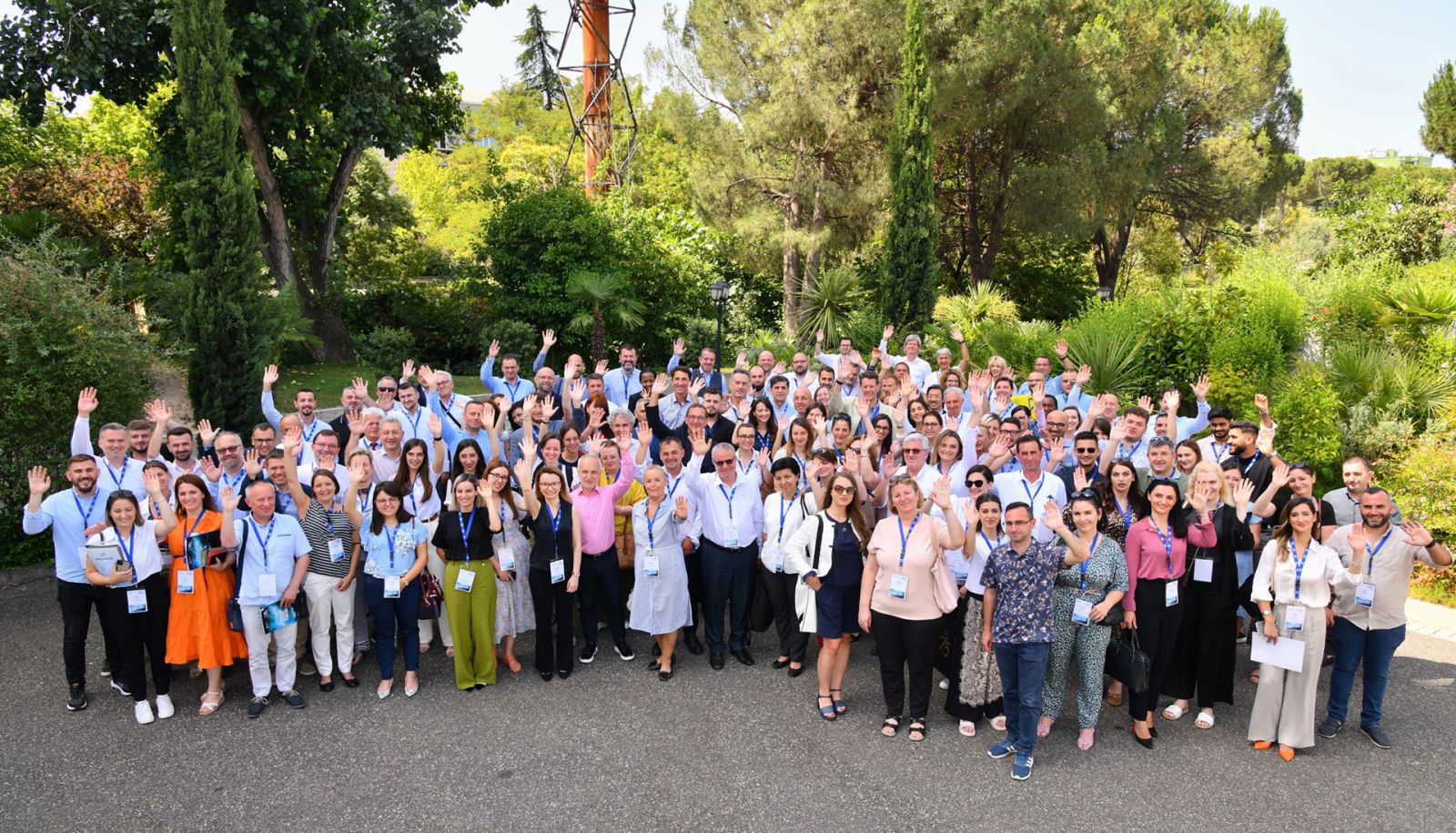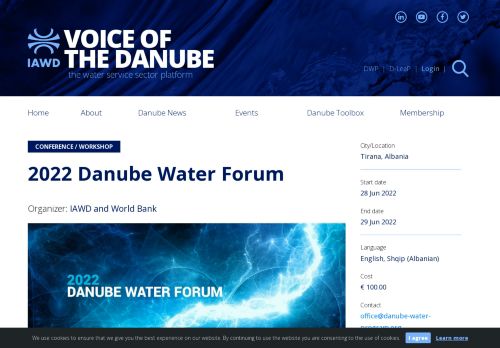
Voice of the Danube
Amazing hospitality. A celebration to remember. And more questions and answers than could possibly fit into a tight schedule. – This was the Danube Water Forum 2022 in a nutshell.
Tuesday afternoon saw the official kickoff of the first live Danube Water Forum after two years of pandemic-related isolation. With some 200 people present, the attendance beat all expectations. Encouraging for the everybody in the water community was the presence of many Young Water Professionals - much will depend on them in the struggles that the Forum discussed over two exciting days.
A warm welcome to the European Youth Capital 2022
Warm words of welcome came from H.E. Enkelejda Muçaj, Deputy Minister at the Albanian Ministry of Infrastructure and Energy, who proudly welcomed the participants to European Youth Capital 2022 Tirana, from Elisabeth Gruber of the Austrian Ministry of Finance, who was the first speaker to address the Forum online, from World Bank Practice Manager Winston Yu, who confessed that the Forum title “Energizing the Water Sector” left him a bit upset: “Shouldn't it rather be DE-energizing and De-carbonizing the water sector?” – and from IAWD President Walter Kling, who happily welcomed the audience back after what he called “these 2 ½ incredible years that we spent missing personal contact. We are united again Let's celebrate!”
A fast lane to a water-smart society
In his introductory keynote, Loïc Charpentier, Water Innovation Policy Manager at Water Europe, the multi-stakeholder platform initiated by the European Commission, presented the vision of a water-smart society which acknowledges the true value of water, manages all available water sources to avoid scarcity and pollution, closes water and resource loops to foster a resource-efficient circular economy and involves all relevant stakeholders in the governance of a resilient water system. He reminded the audience that this was not a far-off vision, but an immediate necessity, especially in the light of a projected 35% increase of the global energy demand by 2035 and a projected 55% increase of global water consumption by 2050, and that three out of four risks identified by the IPCC report are water-related.
In the following discussion panel Mr. Charpentier was joined by Viola Haxhiademi, Secretary General at the Albanian Ministry of Infrastructure and Energy, Hajrije Morina, Director of the Water Services Regulatory Authority in Kosovo, Filip Wanner, Technical Project Manager at Energie AG Bohemia, and moderator Monika Weber-Fahr, Senior Expert.
A wakeup call in the morning
The evening reception brought together friends and colleagues who had not seen each other in years. It also brought the official inauguration of the Albanian water sector reform, a bold streamlining operation that became the theme of lively discussions in the next day's forum sessions.
With so much to celebrate, the Wednesday morning session on the energy market and its effects on the utilities in the Danube region was off to a slightly sluggish start, but quickly picked up speed when Katharina Gassner, Senior World Bank Energy Economist in the Eastern Europe and Central Asia Region, gave her online presentation on the ongoing energy crisis. Without going into water sector-related detail, Ms. Gassner walked the audience through the state of the energy market, the – gladly limited - vulnerability of the six Western Balkan countries to energy price shocks and the arsenal of mitigation measures and long-term investments that are available to governements. She finished by reminding the audience that the World Bank does not see a return to former price levels: “This is really a long-term structural change.”
A weird and cynical paradox
After this general overview, water expert Radoslav Russev treated the implications of rising energy costs for the water sector in a presentation co-authored by UBP Ukraine Hub Coordinator Viktoria Iskova.
“I want to point out today that there is a weird and cynical paradox in our sector,” said Mr. Russev, showing two utility companies with exceptionally high electricity consumption, industrial scale pump systems, huge transmission systems, huge system pressure – and more than 80% non-revenue water. He then pointed out questions that utilities should ask when entering an energy efficiency project, stating that the key word here is “Complexity”, and noting a widespread lack of capabilities to tackle this complexity, not only in the management floor of utility companies, but also in the huge variety of enablers the water sector needs to work on.
A trigger for lasting change?
Mr. Russev and Ms. Gassner were then joined by fellow panelists Christian Minelli of WAREG, Ndricim Shani, Chair of the National Regulatory Commission of the Water Regulatory Authority in Albania, Elisabeta Poci, Executive Director of SHUKALB, Gazmend Daci, Senior Energy Specialist at the World Bank office in Tirana, and György Sugar, General Manager of the PUC “Waterworks and Sewerage“ Subotica.
At the end of a lively discussion on approaches and obstacles to crisis mitigation, moderator Walter Kling mused on the very slow reaction of the water sector to long-known infrastructure issues: “Will we continue business as usual after the initial shock has passed? Or will this serve as a trigger for change?” To which Rado Roussev replied that the most reliable indicator for change would be the presence of chief energy officers in the management teams of utilities: “In two or three years, when prices have hopefully normalized and you have a chat with an executive team in a utility company and you notice that there is a dedicated energy guy or girl on board - that would be a sign that they have started to take the situation seriously.”
In search of innovations
The morning's second session, “Innovative Technologies for Saving and Producing Energy in the Water Sector” brought real-life examples for successful energy-saving programs in utilities. Moderators were the World Bank's Kathia Havens and Stjepan Gabric, who started by reminding the audience that the current energy price-related crisis was no temporary deviation, but rather the sector's future standard operating environment, and that, on the other hand, crisis and necessity are the mother of innovation and progress.
A look at energy-independent plants
Jeliaz Ranglov, Senior Manager of the Kubratovo wastewater treatment plant in Sofia then walked the audience through a long line of improvement measures. Starting from zero in 2008, the plant achieved 100% energy self-sufficiency in 2014 and has spent the last five years oscillating between 100 and 120%. Now mother company Veolia is approaching the vision of an energy independent water supply system for Sofia.
The municipal water utility company of the Austrian capital, follows a similar course, as shown in the next presentation by Vienna Water Staff Unit Manager Wolfgang Gruber. The company produces an annual 63 GWh in 16 drinking water-driven hydroelectric power plants in its system. In addition, Vienna Water draws 2 annual GWh from to photovoltaic plants, with several more in the planning stadium as part of Vienna's ambitioned solar energy offensive.
Vienna Water's technology partner Siemens was represented at the Forum by Gilbert Schreiber, Head of Vertical Water &Environment for Central & Eastern Europe. In his presentation on Energy Management for Water Applications, Mr. Schreiber stressed that while technology can work wonders in terms of creating efficiency, the beginning of every process is about creating transparency, and that, as he puts is, is “not about technology, it is about simply doing things right.”
Rangelov, Gruber and Schreiber were then joined by World Bank Senior Water Supply and Sanitation Specialist Camilo Lombana Cordoba and Florian Kretschmer, Senior Scientist at BOKU university in Vienna for a lively discussion on approaches to energy saving, impacts of real-life projects and also, answering to questions from the audience, on the feasibility of marking excess energy from water and wastewater treatment plants.
Money talks
After the lunch break, the Forum turned to the all-important question of money. Dilip R. Limaye, President of SRC Global Inc. and senior advisor to the World Bank on energy efficiency and renewable energy strategies, walked the audience through a maze of financing options for energy efficiency measures in utilities, ensuring the listeners that while the complexity and the range of available options may look a bit overwhelming, even the most complex financial instruments are now proven and wrapped up in ready-to-use documents.
Adressing the audience from Brussels, Juan Bofill of the Water Management Division of the European Investment Bank presented the European angle, elaborating on the EU Taxonomy, its relation to the EU Green New Deal, and the impact on energy saving and decarbonizing investments in the water sector.
Then Lubomir Filipov took the stage with an innovative approach to innovation financing: Tapping into the very lively Bulgarian startup scene, his company has developed a model for partnerships with startups, using Sofia Water as a testing ground for their ideas and at the same time gathering valuable know how.
Joining the speakers for the ensuing panel, Eduart Rumani, National Programme Officer at the Swiss Embassy in Albania, provided insights into the Swiss contribution to Albania's freshly started ambitioned water sector reform, and Sokol Xhafa, CEO of the Regional Water Company in Pristina, Kosovo, related his personal experience with financing and related challenges when a water company aims to improve its efficiency.
Understanding bottlenecks…
The afternoon's second session dealt with creating an enabling environment to energize the water sector. World Bank Senior Water and Sanitation Specialist Dambudzo Muzenda presented “Policy, Institutions, Regulation”, short PIR, the World Bank's conceptual framework for understanding governance bottlenecks in water and sanitation service delivery. Applied in 20 countries on four continents so far, this instrument represents the missing link for resolving some of the chronic challenges undermining the water sector.
…and changing things.
Next, Klevis Jahaj, General Director of AKUM, the Albanian National Agency for Water Supply, Sewerage and Waste Infrastructure, presented the outlines of the Albanian water sector reform program, which undertakes to aggregate some 50, often very small utilities in 15 economically feasible companies while engaging in a modernization program that currently documents itself in 100 construction sites across Albania.
The human factor
Covering the human resource dimension, Vesna Muslić of the Aquasan Network in Bosnia-Herzegovina, presented D-LeaP, the regional partnership to capacitiate the water sector. So far, D-LeaP has trained staff from 437 utilities in 17 hubs and 13 countries, covering a wide range of themes from energy efficiency to access to financing and every facet of utility operation and management in between.
Moving the needle
Evis Gjebrea, Deputy General Director of the Tirana Water and Wastewater Utility and Alba Zhori, Head of Performance Sector at the Albanian Water Resources Management Agency then joined in for a very lively panel that was in the end summed up by Ms. Muzenda: “To really move the needle in the water sector we need a holistic integrated approach, structured institutionalized vehicles, data gathering and information sharing to ensure continuous processes. It is never enough to have a one-off intervention that quickly fizzles.”
“Energizing hope”
The wrap-up session was carried by IAWD President Walter Kling, SHUKALB Executive Director Elisabeta Poci, World Bank's Kathia Havens and Ivaylo Kolev of the World Bank in Romania. “I hope we energized you to Deenergize,” remarked Winston Smith in a lively exchange, end with a glance at the results of the ongoing crowd poll on the key takeaways from the Forum he smiled: “I like `energizing hope´”.
The rest was lots of applause and a bus to a seaside closing dinner. You should have been there, and if you weren't, please keep monitoring Voice of the Danube – the full reports from the sessions will be online soon.

VoD - 2022 Danube Water Forum
The 2022 Danube Water Forum “Energizing the Water Sector in the Danube Region” will convene on 28 – 29 June, 2022 in Albania’s capital city Tirana, back to back with the Conference on “The Benchmarking and Asset Managem...
